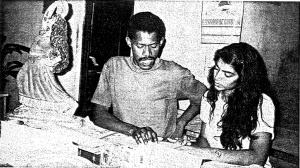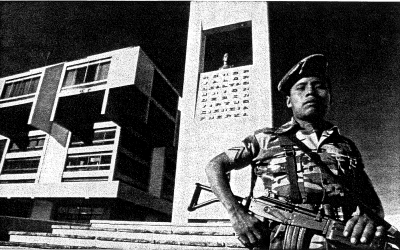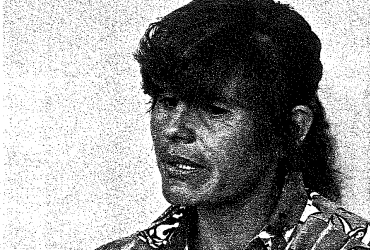Comings and Goings: Health at the Margins

Renu Edpuganti, the a first-year student at Harvard Medical School, worked one summer in Northeast Brazil in a COSSAH project.
Marilyn Nations, a researcher in the poorest reaches of Northeast Brazil, came to Harvard recently to tell the story of how romantic advisors and Afro-Brazilian Umbanda healers had become effective warriors against AIDS. Community trust in them, as well as intensive investigations of local values and sex practices, are resulting in an effective AIDS prevention campaign.
Roberto Lewis-Fernandez, a psychiatrist from the Puerto Rican Mental Health Research Center, had a similarly absorbing tale, of how both Puerto Ricans on the island and migrant workers in Hartford, Connecticut, suffer breakdowns precisely because their identity is so closely tied to self-control.
David Halperin, a surgeon who went back to the Harvard School of Public Health at age 48 to enable himself to work in the remote hills of Chiapas in southernmost Mexico, described how social forces and cultural notions, rather than knowledge of contraceptive methods, determine birth control use.
Nations, Lewis-Fernandez, and Halperin were three of the Consortium for Social Science and Health (COSSAH) researchers from Brazil, Haiti, Mexico, Peru, Puerto Rico, and the United States who journeyed to Harvard with a common goal: to exchange information and share experiences about such health issues as infectious diseases, culture and poverty, reproductive health, and mental health, violence and identity.
“We need to examine together a series of health problems faced by marginalized populations in those parts of Latin America in which we currently work,” said Kristian Heggenhougen, who spearheaded the two-day conference “Promoting Health at the Margins in Latin America” November 17 and 18. Heggenhougen, Associate Professor of Medical Anthropology, Harvard Medical School, and Associate Professor of Population Sciences, Harvard School of Public Health, added, “It is now widely agreed that social forces–including cultural, political, and economic factors–shape the distribution and course of most sickness and suffering.”
The conference was cosponsored by the David Rockefeller Center for Latin American Studies and the Program in Social Analysis for Health in the Americas (PROSANHA), as well as COSSAH.
In March, 1997, the Department of Social Medicine at the Harvard Medical School officially established PRO-SANHA. The new program is closely linked to COSSAH and composed of members in affiliated research, teaching and service institutions in Latin America and the United States, who are also Lecturers in the Department of Social Medicine.
Arthur Kleinman, head of the Department of Social Medicine at the Harvard Medical School and the Maude and Lillian Presley Professor of Medical Anthropology, explained that the Department of Social Medicine is a social-science-based department, drawing on such fields as medical anthropology and the history of medicine.
“One of the things the Department has tried to do is work with departments and centers around the University,” said Kleinman. “This is not just a one-shot engagement, but part of a continual effort to bring together strengths across the university.”
He pointed out that the PROSAHNA/COSSAH researchers are all either faculty or former fellows at the Department of Social Medicine, but embrace different disciplines such as anthropology, medicine, and mental health.
Interdisciplinary research in the health field is becoming more frequent, but usually just combines standard social science concerns with health research. PROSANHA-COSSAH researchers, gathering at Harvard for the conference, took that one step further in an approach they dub “ecological.” This new approach to understanding why people in poor communities get sick encompasses such factors as norms of sexual behavior, land tenure, access to credit and technology, migration, kinship structures, environment, mass media, and transculturation.
“Modernization comes with such an onslaught that it leaves the marginalized even more marginalized and has a negative impact on health,” said Marilyn Nations, who described Northeast Brazil, where she has worked for 17 years, as “the largest expanse of poverty in the Western Hemisphere.”
Winter 1998
Related Articles
Interviewing Military Officers
We drove up into the residential hills of Villa Hermosa, overlooking the city of Guatemala, searching for the house amongst the many white-stucco, high-walled mansions. I asked the taxi-driver …
Disobedient Autobiographies of Las Desobedientes
From the quasi mythical conquista-age Malinche to contemporary women such as Rigoberta Menchú and Rosario Castellanos, Las Desobedientes restitutes the women of Latin American history …
Delivering the Data
Marta was 18, living at home in El Salvador, when she dated a man who raped her. She told her father about the rape, and he responded by threatening to kill her for damaging the family’s …




